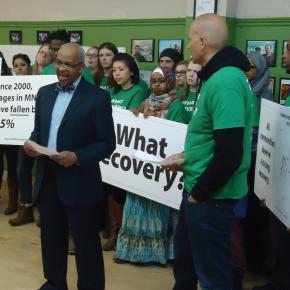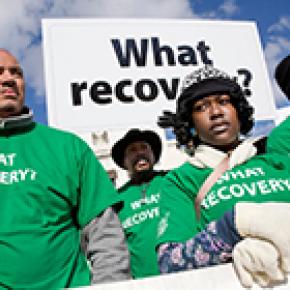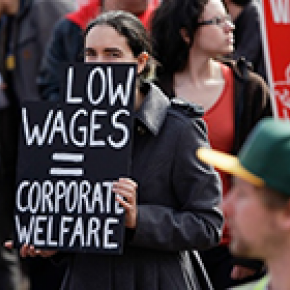The Team That Helped Elect Alexandria Ocasio-Cortez Has Its Next Mission: Lifting Kerri Harris Over Sen. Tom Carper

The Team That Helped Elect Alexandria Ocasio-Cortez Has Its Next Mission: Lifting Kerri Harris Over Sen. Tom Carper
That volunteering eventually morphed into becoming a full-time community organizer, working both for Achievement...
That volunteering eventually morphed into becoming a full-time community organizer, working both for Achievement Matters, which aims to close the educational achievement gap, and with the Center for Popular Democracy. The tools she’s picked up as an organizer are now being put to work in her Senate race.
Read the full article here.
Death Cab for Cutie, Jim James, more protest Donald Trump with new songs

Death Cab for Cutie, Jim James, more protest Donald Trump with new songs
Death Cab for Cutie After writer Dave Eggers attended a Donald Trump rally this past June, he realized now...
Death Cab for Cutie
After writer Dave Eggers attended a Donald Trump rally this past June, he realized now would be a good time for the “resurrection of the political protest song.” So he called up some artists, including Jim James and Aimee Mann, who wrote tracks for a project that would later become a playlist titled 30 Days, 30 Songs. That playlist, touted as being “written and recorded by musicians for a Trump-free America” launched Monday with Death Cab for Cutie’s “Million Dollar Loan.”
“From Woody Guthrie to Public Enemy, we know that songs can change minds, and particularly now, we need to motivate voters to stand against bigotry, sexism, hatred and ignorance,” Eggers said in a statement.
Eggers launched the playlist — available on Spotify and Apple Music — Oct. 10, 30 days before election day. Thao Nguyen, clipping., and Bhi Bhiman, among others, also contributed tracks, along with R.E.M., who offered up a never-before-released live song for the compilation.
A new track will debut at noon ET each day up until Nov. 8, and all proceeds will go toward the Center for Popular Democracy. Hear Death Cab’s entry below.
BY ARIANA BACLE
Source
Report: In MN, Jobless Rate for Blacks is Nearly 4 Times Higher than Whites
Bring Me the News - March 5, 2015, by Adam Uren - Minnesota has the third-highest unemployment gap between white and...
Bring Me the News - March 5, 2015, by Adam Uren - Minnesota has the third-highest unemployment gap between white and black people in the country – with the jobless rate among blacks almost four times higher than among whites.
The figures come from a new study by the Center for Popular Democracy, which shows that the unemployment rate in Minnesota among black resident is 3.7 times higher compared to white people.
This is second only to the District of Columbia (5.6 times) and Wisconsin (4.6 times).
The gap in Minnesota has lessened since 2007 however, when 3.85 times
It also found that the jobless rate among Hispanic people is more than two times greater than for white people.
A rally will be held Thursday, WCCO reports, which will “draw attention to the racial differences between wages and jobs available” in the Twin Cities and Minnesota as a whole.
It is being organized by representatives of Neighborhoods Organizing for Change (NOC), the Center for Popular Democracy and the Economy Policy Institute, and held at the NOC offices in W. Broadway Ave., Minneapolis, starting at 3 p.m.
Unemployment falling, gap still wide
The significant disparity between black and white unemployment remains, even though overall unemployment has dropped in recent years thanks to the recovery of Minnesota’s economy since the financial crisis.
The unemployment rate among black people across the state fell to 11.9 percent in 2014, compared to 15.4 per cent in 2007.
However, the rate among white people stood at just 3.2 percent in 2014, down from 4 percent in 2007. The report also found that the unemployment rate among Hispanics stood at 7 percent in 2014, almost the same as it was in 2007.
The unemployment gap is even worse in the metro area, with the graph above showing that the black unemployment rate is 3.89 times higher than white.
The report features a case study of 23-year-old Minneapolis resident Tyrone Raino, who told the Center for Popular Democracy the only full-time job he could find is 40 minutes outside the city, and he works there 40 hours a week while taking a further 20 hours of classes every week.
Disparity is nothing new
Minnesota regularly features among the worst states for racial unemployment gaps.
In 2013, Minnesota was second only to Wyoming according to the Bureau of Labor Statistics, the Star Tribune reports, when the black unemployment rate was triple the white rate.
And in 2011, MPR reported on a study by the Economic Policy Institute, which found the Twin Cities along with Memphis had the biggest white-black unemployment gaps out of the nation’s 50 biggest metropolitan areas.
When The Atlantic ran a piece last month lauding the metro area for its winning mix of affordability, opportunity and wealth, several publications responded by highlighting the gaps that suggest not everything is rosy in the Twin Cities.
It’s not just with unemployment either. WalletHub found Minnesota has the second-worst wealth gap between white people and people of color in the United States, as well as one of the biggest gaps for home ownership levels.
Source
U.S Workers say the economy needs more support
BetaWired - November 15, 2014 - Jean Andre an American activist decided to visit the Federal Reserve Board’s...
BetaWired - November 15, 2014 - Jean Andre an American activist decided to visit the Federal Reserve Board’s headquarters on Friday to express his concerns about getting a decent job. Janet L. Yellen, the Fed’s chairwoman, agreed to meet him together with about 30 workers concerning the plight of Americans searching for work and struggling to make a living.
Accompanied by Fed’s board of governors officials; Stanley Fischer, the vice chairman; Lael Brainard; and Jerome H. Powell, the jobless Americans had a chance to express their views for about an hour.
Ady Barkan, a lawyer with the Center for Popular Democracy, an advocacy group based in New York that orchestrated the meeting said “The Federal Reserve is too important of an institution to be insulated from the voices and perspectives of working families, we think that the Fed needs to listen more and be more responsive, and we’re very grateful for this first opportunity.”
The Fed declined to comment, citing a policy of silence about private meetings but the workers described what they said in the meeting that was closed to the media. Ady Barkan’s group is campaigning for the Fed to carry on with its stimulus program, citing the high level of unemployment, particularly in minority communities, and the slow pace of wage growth. The group further argued that the Fed could help drive wages up by keeping interest rates low.
According to Josh Bivens, an economist at the Economic Policy Institute, a liberal research group, “monetary policy would be “the single most important determinant of wage growth” and that he was glad to see workers recognize the Fed’s importance. A conservative group, American Principles in Action, criticized the meeting as “highly political” and inappropriate expressing that it would seek a related meeting to share its view that the Fed’s stimulus campaign is damaging the economy.
The labor and community groups at the meeting wore green T-shirts that said “What Recovery?” on the front, with a chart demonstrating meager wage gains on the back. They also compelled Yellen to change the way the Fed chooses the presidents of its regional banks.
On Thursday, The Federal Reserve Bank of Dallas stated that its president, Richard W. Fisher, would step down on March 19 2015. Furthermore, Charles I. Plosser, president of the Federal Reserve Bank of Philadelphia, plans to retire at the beginning of March.
Source
The United Cities of America: What Seattle's Minimum-Wage Deal Means
The Atlantic - May 2, 2014, by Eric Liu - On Wednesday, a Senate...
The Atlantic - May 2, 2014, by Eric Liu - On Wednesday, a Senate filibuster blocked President Obama’s proposal to raise the federal minimum wage to $10.10. Then on Thursday, Mayor Ed Murray of Seattle announced a business-labor deal to raise the city minimum wage to $15.
Procedurally, these two things had nothing to do with each other. Substantively, Seattle’s action is a direct result of the Senate’s inaction—and it portends the acceleration of two trends in public policy today: a growing willingness to reckon with radical inequality and wage stagnation, and the emergence of networked localism as a strategy for political action.
Let’s first unpack what happened in Seattle. The mayor appointed a committee of citizens to develop a proposal for $15. I was a member of that task force, which included union leaders and businesspeople and nonprofit heads and chamber-of-commerce chiefs. We gathered data. We commissioned studies. We held a big public symposium. Negotiations were complex and often heated and the committee missed its deadline, but we eventually got a deal that won the support of 21 of 24 members.
The grassroots “$15 Now” activists who helped propel a socialist to the city council and helped put this issue on the map last year are unsatisfied with the number of years and the accommodations. They aim to go to the ballot directly with a plan that’s closer to, well, $15 now. And the city council still must vote to enact this or any plan, and may come under pressure to amend it many ways.
The deal is nobody’s picture of perfect. It’s a compromise. It phases in minimum-wage hikes so that an employer has to get to $15 in three years (for businesses with more than 500 employees), four years (same, but offering healthcare), or seven years (for businesses with fewer than 500). The under-500 businesses also get several years to count a portion of worker tips and healthcare toward the wage requirements.
But pull back from the substantive details and the process hoops ahead. This is, as the vice president might say, a big f-ing deal. It’s not just the $15 figure, which sets the floor higher than in any other city or state. It’s the fact that a broad coalition with significant business support made it happen.
That makes this deal a model for other cities—and further evidence that norms are changing. It suggests that it’s becoming less acceptable in America to run a business in a way that relies on poverty wages. It’s becoming less acceptable to suggest that the go-to remedy for the pain of working people should be tax cuts for the wealthy. And though a minimum-wage increase is not an innovative tool, its revival is part of a widening repertoire of policy ideas for closing the opportunity gap.
We brought in leaders and experts from Chicago, Philadelphia, San Francisco, New York—all cities that have raised the wage or taken steps to.
Perhaps more significantly, Seattle’s action shows we’re entering a new age of bypass. Washington is stuck and will be for the foreseeable future. So it falls increasingly to cities to act—and in increasingly coordinated ways. As the Seattle task force explored possible pathways to $15, we brought in elected leaders and experts from San Jose, Chicago, Philadelphia, San Francisco, New York, all cities that have raised the wage or taken steps to. We all shared tactics, policy proposals, lessons, and language.
Groups like Local Progress have emerged to link up politicians and policy entrepreneurs from disparate cities, not just on wages but also on criminal-justice reform, immigrant rights, voting rights, climate change, and other issues. The cities of the United States are beginning to web up into an archipelago of policy experimentation and problem-solving.
This networked localism is distinct from the mere downward distribution of national political dollars to local campaigns. It’s also distinct from the Koch brothers’ strategy of creating wholly owned political subsidiaries in small towns to push agendas. And it’s not just about having mayors who are skillful, important as that is. Networked localism is a form of citizenship from the middle out and the bottom up, where residents decide to act together and to learn in real time from their counterparts in other places.
Thus far, perhaps owing to the progressive tilt of big cities, networked localism seems to be practiced mainly by progressives. That may place a political limit on its ultimate reach. Another limit, of course, is structural: On most issues, even well-woven webs of cities cannot do what a well-run national government can. A $15 wage will directly benefit tens of thousands of low-income workers in my city. It does nothing for millions of others in my country.
Nevertheless, it’s safe to say that Seattle’s $15 moment is a sign of a shift in self-government. The last century rewarded political leaders like TR or LBJ who knew how to centralize the local into the national. This century may belong to those who can decentralize the national—but into a new kind of national. Call it the United Cities of America.
Source
Unpredictable Work Schedules: As Companies Shave Costs With Just-In-Time Scheduling, Workers, Regulators Fight Back
Unpredictable Work Schedules: As Companies Shave Costs With Just-In-Time Scheduling, Workers, Regulators Fight Back
Brianna Roy-Rankin, 23, is just the kind of worker Target would like to retain and promote. She says she loved her job...
Brianna Roy-Rankin, 23, is just the kind of worker Target would like to retain and promote. She says she loved her job at the retailer's store in Champaign, Illinois. She had great bosses, got along well with her co-workers and enjoyed the employee discounts. But last week, after two years as a sales associate, Roy-Rankin quit her job.
“I couldn’t really plan. I was at the mercy of the scheduling system,” she says. “Otherwise, I honestly, probably, would’ve stayed.”
Roy-Rankin went to college nearby, at the University of Illinois. Before she graduated in May, she says it was a constant challenge to balance her studies and social life with her part-time job -- usually around 20 hours a week at just under $10 an hour.
Target has an unforgiving scheduling system. Roy-Rankin says she would have to submit requests to take time off for spring break or visit her parents weeks, if not months in advance -- otherwise she’d be slotted to work without recourse. She would learn about her weekly work schedule three weeks in advance, which wasn’t too bad. But then her hours would fluctuate drastically. One week, she’d be scheduled for a 8 a.m.-to-noon shift on a particular day; the next, it might be a 5 p.m.-to-11 p.m. closing shift. Eventually, it became too much to juggle.
Roy-Rankin's situation is hardly unique.
A Common Trend
Nearly three in 10 hourly workers in the United States say they rarely get consistent work schedules, according to a study released Tuesday by WorkJam, a firm that specializes in workforce scheduling technology.
What’s more, an astounding 56 percent say they get their schedules a week or less in advance. Both trends run rampant in the fast-growing service sector, especially in low-wage fields like retail and fast food. And while policies of this sort save companies money by allowing them to tailor schedules to an expected flow of customer traffic, workers say it's the source of headaches.
Joshua Ostrega, chief operating officer and co-founder of WorkJam, admits the 56 percent figure came as a bit of a shock. “I think it’s extremely high,” he says. “We were actually quite surprised.”
Workers Employed in the Retail Trade Industries (Seasonally Adjusted) | FindTheData
An especially harsh practice among retailers is what’s known as just-in-time or on-call scheduling. Under this system, workers are required to be “on call” to come in and work on a particular day even if they’re not scheduled to do so.
The industry’s profit margins are tight, says Ostrega, and companies are looking to extract savings however they can. Software-based scheduling systems do the trick by linking labor supply to consumer demand. When store traffic is low, the system calls for fewer employees; when the system projects more patrons, it demands more workers. Employers like it because it keeps them from racking up unnecessary labor costs.
Now, unpredictable scheduling is increasingly drawing the interest of public authorities.
'The Pressure's Mounting'
In April, New York Attorney General Eric Schneiderman sent letters to major retailers that inquired about their on-call scheduling and asked whether their policies violated state law. Like seven other states and the District of Columbia, New York has so-called reporting-time laws that require employees to be paid when they report to work, even if no work is provided.
Since the letters went out, a number of high-profile companies have announced changes to their policies. The Gap and Abercrombie & Fitch, which both received the notices, said they would end the practice of on-call scheduling. And Starbucks promised last year to provide more consistent scheduling to baristas. But as a recent story in the New York Times revealed, the cafe chain has failed to do so.
Robert Hiltonsmith, senior policy analyst at Demos, a progressive think tank, expects the positive trends to continue -- even if Tuesday’s survey suggests employers overall aren’t relenting on tough and irregular scheduling demands. “I think it’s a slow burn, but the pressure’s mounting,” he says.
It’s in part a question of economic self-interest, Hiltonsmith says. Burned-out workers tend to quit their jobs fairly quickly, and high turnover is expensive. That’s one of the reasons why Walmart, the nation’s largest private-sector employer, and its top competitors voluntarily hiked wages earlier this year, according to Hiltonsmith. In fact, when Walmart announced it was boosting starting pay to at least $9 an hour, it also promised to notify workers of their schedules at least two and a half weeks in advance.
Reforms like this and others -- shifts that are scheduled the same time every week -- could prevent retailers from losing employees like Roy-Rankin, the kind of people who are otherwise content at work.
There’s also mounting political pressure, which stems from growing public concern over the livelihood of service-sector workers. Hiltonsmith attributes this to the “seismic shifts in the labor force” -- the decades-long decline of manufacturing and growth in service-sector employment.
Contrary to the popular image, retail workers are not teenagers looking to make a quick buck. The median age of a retail trade employee is 38, according to the federal Bureau of Labor Statistics.
“I think people had less concern when it wasn’t people trying to support their families,” Hiltonsmith says. “For better or worse, the service economy is the economy of the country’s future.”
Source: International Business Times
100 groups call for Climate Investment Funds to sunset

100 groups call for Climate Investment Funds to sunset
Ahead of this week's meeting of the trust funds of the World Bank’s Climate Investment Funds, 100 groups have called...
Ahead of this week's meeting of the trust funds of the World Bank’s Climate Investment Funds, 100 groups have called for the CIFs to finally sunset, now that the Green Climate Fund is clearly operational. Two-thirds of the groups are from developing countries.
Here's the letter.
June 14, 2016
Dear Trust Fund Committee Members of the Strategic Climate Fund and Clean Technology Fund:
Now that it has approved projects and is beginning to disburse money, the Green Climate Fund is clearly operational. It is thus also unambiguously clear that it is time for the World Bank’s Climate Investment Funds to sunset.
Since their inception, the CIFs were meant to be interim funds. In 2008, the sunset clauses of the Strategic Climate Fund and the Clean Technology Fund said, “…the SCF will take necessary steps to conclude its operations once a new [UNFCCC] financial architecture is effective…” and “the CTF will take necessary steps to conclude its operations once a new [UNFCCC] financial architecture is effective.”[1] That new financial architecture – the Green Climate Fund – is now indisputably effective. The CIFs’ raison d'etre has expired; attempts to reinterpret the obvious must cease.
Unlike the multilateral development bank-driven CIFs, the GCF was set up according to the principles of the United Nations Framework Convention on Climate Change. With a governance structure evenly split between developed and developing countries, the GCF is founded on a “country-driven approach” accountable to the institutions and people in developing countries, and has placed a premium on direct access to funds by developing country entities. The GCF promotes a gender-sensitive approach to its funding – the first climate fund to do so from the outset of its activities.
While lessons learned from the CIFs should be applied to the GCF, efforts to spin the CIFs as complementary to the GCF are disingenuous. Resources directed toward the CIFs are resources that should instead be directed to the GCF. Any effort to raise new sources of finance for the CIFs should cease immediately, and there should be no new investments.
Thank you for your consideration.
Sincerely,
11.11.11-Coalition of the Flemish North-South Movement, Belgium
ActionAid International
Aksi for Gender, Social and Ecological Justice, Indonesia
All Nepal Peasants Federation, Nepal
All Nepal Women’s Association, Nepal
Alliance Sud, Switzerland
Alyansa Tigil Mina (Alliance Against Mining), Philippines
Aniban ng Manggagawa sa Agrikultura, Philippines
Asia Pacific Forum on Women, Law and Development, Thailand
Asian Peoples Movement on Debt and Development, Regional
ATTAC Japan
BankTrack, Netherlands
Beyond Beijing Committee, Nepal
Both ENDS, Netherlands
Bretton Woods Project, United Kingdom
Bukluran ng Manggagawang Pilipino, Philippines
Campaign for Climate Justice, Nepal
Carbon Market Watch, Belgium
Center for Biological Diversity, United States
Center for Environment, Bosnia and Herzegovina
Center for Popular Democracy, United States
Center for Socio-Economic Research and Development, Nepal
Centre for 21st century Issues (C21st), Nigeria
Centre for Social Impact Studies, Ghana
Centre pour l'Environnement et le Développement, Cameroon
Centro Humboldt, Nicaragua
Centro Salvadoreño de Tecnologia Apropiada/Friends of the Earth El Salvador
Christian Aid, United Kingdom
Civic Concern Nepal
Climate Action Network Europe, Regional
Climate Change & Development NGO Alliance, Azerbaijan
Climate Finance Group for Latin America and the Caribbean (GFLAC), Mexico
CNCD-11.11.11, Belgium
Consumers Protection Association, Lesotho
Digo Bikas Institute, Nepal
Ecological Christian Organisation, Uganda
Ecological Society of the Philippines
Environics Trust, India
Farmers Forum South Asia, Regional
Finance & Trade Watch, Austria
Food & Water Watch, United States
Foundation HELP, Tanzania
Freedom from Debt Coalition, Philippines
Friends of the Earth - England, Wales and Northern Ireland
Friends of the Earth United States
Gender Action, United States
Global Catholic Climate Movement Pilipinas, Philippines
Green Development Advocates, Cameroon
Haburas Foundation/ Friends of the Earth Timor Leste
Heinrich Böll Stiftung North America
Himalaya Niti Abhiyan, India
Human Rights Alliance Nepal
Indian Social Action Forum, India
Indigenous Environmental Network, United States/International
Institute for Agriculture and Trade Policy, United States
Institute for Policy Studies, Climate Policy Program, United States
Interamerican Association for Environmental Defense (AIDA), Regional
International.Lawyers.Org, Switzerland
Jagaran Nepal
Jamaa Resource Initiatives, Kenya
Jeunes Volontaires pour l'Environnement, Niger
Kitanglad Integrated NGOs, Inc., Philippines
Korea Federation for Environmental Movements, South Korea
KRuHA – Peoples Coalition on Water, Indonesia
Labour, Health and Human Rights Development Centre, Nigeria
LDC Watch, International
Leads Nigeria
Les Amis de la Terre France
Migrant Forum in Asia, Regional
National Coastal Women's Movement, India
National Hawkers Federation, India
National Women Peasants Association, Nepal
Nepal Youth Peasants Association, Nepal
Nigerian Conservation Foundation, Nigeria
NOAH Friends of the Earth Denmark
PALAG Mindanao, Philippines
Panay Rural Development Center, Inc., Philippines
Philippine Movement for Climate Justice, Philippines
Philippine Network for Rural Development and Democratization, Philippines
Policy Analysis and Research Institute of Lesotho
Population, Health, Environment Ethiopia Consortium, Ethiopia
Practical Action, United Kingdom
Reacción Climática, Bolivia
River Basin Friends, India
Rural Reconstruction Nepal
Sahabat Alam Malaysia/Friends of the Earth Malaysia
Sanlakas Philippines
Solidaritas Perempuan, Indonesia
South Asia Alliance for Poverty Eradication, Regional
South Asia Food Sovereignty Network, Regional
South Asia Peasants Coalition, Regional
Southern Oregon Climate Action Now, United States
Students for a Just and Stable Future, United States
SustainUS, United States
Third World Network, Malaysia
Trade Union Policy Institute of Nepal
VOICE Bangladesh
WomanHealth Philippines
Women Welfare Society, Nepal
Worldview-The Gambia
By Karen Orenstein
Source
NY furioso con plan tributario aprobado por el Senado
Las principales autoridades y activistas de Nueva York rechazaron este sábado el plan tributario aprobado en la...
Las principales autoridades y activistas de Nueva York rechazaron este sábado el plan tributario aprobado en la madrugada por el Senado federal que deberá ser armonizado con el de la Cámara Baja antes de llegar al despacho del presidente Donald Trump.
“Los republicanos han votado por un plan que ni siquiera tuvieron tiempo de leer. Una vez más probaron que les importan más sus donantes de campaña que las familias trabajadoras”, indicó el alcalde Bill de Blasio en un comunicado tras agregar que esta votación significa un incremento de impuestos para 87 millones de familias.
Lea el artículo completo aquí.
Jackson Hole Demonstrators Rally Against Rate Hike
Associated Press - August 22, 2014, by Matthew Brown — Shadowing central bankers and economists at the annual Federal...
Associated Press - August 22, 2014, by Matthew Brown — Shadowing central bankers and economists at the annual Federal Reserve conference here, a group of about 10 demonstrators pressed Fed Chair Janet Yellen not to yield to pressure to raise interest rates.
Carrying placards and green T-shirts embossed with the slogan "What recovery?" they said they'd come from New York, Missouri, Minnesota and elsewhere to draw attention to people left behind by the recovery and still unable to find work.
One demonstrator approached Yellen to press his point as she prepared to enter the opening reception Thursday night. With security guards hovering nearby, the two shook hands and spoke for about a minute before Yellen entered the closed-door gathering.
Yellen spokesman Doug Tillett said her staff would seek to arrange a meeting between the chair and the demonstrators back in Washington.
Their message was generally in sync with Yellen's stance since she became Fed chair in February to keep rates low to help support a still-subpar economy. In a speech to the conference Friday, Yellen noted that while the unemployment rate has steadily dropped, other gauges of the U.S. job market have been harder to evaluate and may reflect continued weakness.
The timing of a Fed rate increase remains unclear, though many economists foresee an increase by mid-2015.
The demonstrators, including several who said they were unemployed or had settled for low-wage jobs, said they'd traveled here to encourage Yellen not to give in to those who say rates must be increased to avoid causing high inflation or other financial instability.
The demonstrator who approached Yellen before the opening reception was Ady Barkan of a group called the Center for Popular Democracy in New York.
"She said she understood what we were saying and that they were doing everything they can," Barkan said Friday. "We'd like them to do more."
He argued that the Fed should lower its target for unemployment and factor in whether wages are rising consistently before making any move to raise rates.
Tillett, the Yellen spokesman, said, "We're certainly willing to meet with them and hear what they have to say."
Asked whether there were security concerns in having demonstrators approach Yellen and seek to buttonhole other conference attendees, Tillett said, "We appreciate their freedom of expression."
The demonstrators also met before the event with Esther George, president of the Federal Reserve Bank of Kansas City, which sponsors the Jackson Hole event. Later, they managed to corner Fed Vice Chair Stanley Fischer during a break in the proceedings.
"We're not in recovery," Cee Cee Butler, a 34-year-old mother of two from Washington, D.C., told Fischer. "It may be fine on Wall Street, but on my streets, it's not fine at all...There's a lot of homeless people that live in my city, a lot of children that panhandle quarters."
Butler said she works a minimum wage job at McDonald's and receives food stamps but still can't make ends meet. She said the trip to Wyoming — her first time aboard an airplane, she said — was paid for by donations from advocacy groups.
Another demonstrator, 42-year-old Kendra Brooks, told Fischer that she holds a master's degree in business administration but has seen her income drop by more than half since losing her job as a program director at a nonprofit about a year and a half ago.
Two weeks ago, Brooks said, she began working for Action United in Philadelphia, a community advocacy group. But it's not comparable to her former job, she said, and "is like starting from scratch."
"They heard what we said, but the outcome of that, in terms of interest rates, is still pending," Brooks said of the group's interactions with Yellen, George and Fischer. "This has been what my recovery looks like, and it's a nightmare."
Source
Arizona’s special election could send an important message for the midterms — even if the GOP wins

Arizona’s special election could send an important message for the midterms — even if the GOP wins
Ady Barkan, the man with ALS who became nationally famous for confronting Sen. Jeff Flake over his support for the...
Ady Barkan, the man with ALS who became nationally famous for confronting Sen. Jeff Flake over his support for the Republican tax bill has thrown his support behind Tipirneni, creating a viral web ad for her campaign.
Read the full article here.












2 months ago
2 months ago